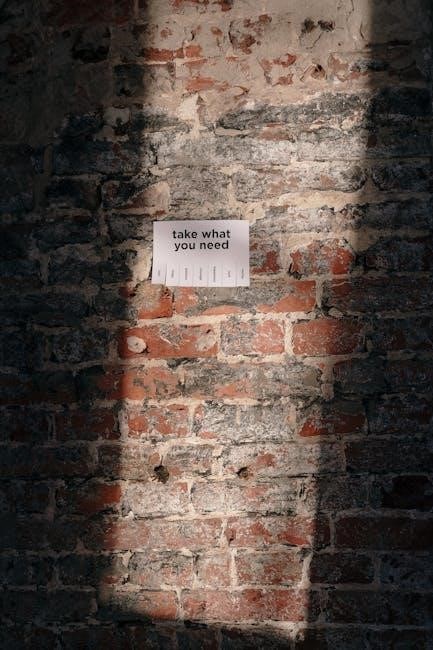The 25 Essential Documents are crucial for ensuring your wishes are honored and your loved ones are protected. Proper planning prevents legal complications and financial burdens, offering peace of mind.
Overview of the Importance of End-of-Life Planning
End-of-life planning is a critical process that ensures your wishes are respected and your loved ones are protected from unnecessary stress and financial burdens. The 25 essential documents, as highlighted by the Wall Street Journal, play a pivotal role in organizing your affairs, preventing legal complications, and safeguarding your legacy. These documents address everything from estate distribution to healthcare preferences, providing clarity and peace of mind. Without proper planning, families often face emotional turmoil, financial losses, and unresolved conflicts. By preparing these documents, you ensure that your assets are managed according to your intentions, and your heirs are spared from potential disputes and financial strain. This proactive approach not only honors your desires but also demonstrates love and responsibility for those you leave behind, making it an indispensable step in securing their future.
Wall Street Journal’s Perspective on Necessary Documentation
The Wall Street Journal emphasizes the significance of having 25 essential documents to ensure a smooth transition of your estate and affairs. These documents, as outlined in their detailed checklist, include a Last Will, Revocable Living Trust, Durable Financial Power of Attorney, Advance Healthcare Directive, and documentation of housing and land ownership. The WSJ highlights that without these documents, families may face legal challenges, financial strain, and emotional distress. Proper organization and communication of these documents are crucial, as they guide your heirs in carrying out your wishes and managing your assets. The WSJ’s approach underscores the importance of proactive planning to avoid conflicts and ensure your legacy is protected. By preparing these documents, you not only safeguard your family’s future but also provide them with clarity and peace of mind during difficult times.

Key Documents Everyone Should Prepare
Essential documents include a Last Will and Testament, Revocable Living Trust, Durable Financial Power of Attorney, Advance Healthcare Directive, and property ownership records. These ensure your wishes are honored and protect your heirs.

Last Will and Testament

A Last Will and Testament is a foundational document that outlines how your assets, property, and possessions should be distributed after your passing. It allows you to appoint an executor to manage your estate, name beneficiaries, and specify how each asset should be allocated. This document also enables you to designate guardians for minor children or pets and include special instructions for funeral arrangements. Without a will, state laws dictate the distribution of your assets, which may not align with your wishes. A will ensures clarity and prevents potential disputes among heirs. It is essential to update your will periodically to reflect life changes, such as marriages, divorces, or the birth of children. Properly executing a will with a witness and notation ensures its validity and enforceability.
Revocable Living Trust
A Revocable Living Trust is a powerful estate planning tool that allows you to manage and distribute your assets during your lifetime and after your death. It is created by the grantor (you), who transfers ownership of assets into the trust, which is then managed by a trustee (often yourself). This document enables you to specify how your assets should be distributed to beneficiaries, similar to a will, but with added benefits. Unlike a will, a living trust bypasses probate, saving time and legal fees. It also maintains privacy, as the trust’s contents remain confidential. You can modify or revoke the trust at any time, making it highly flexible. A successor trustee takes over upon your death or incapacitation, ensuring seamless asset management. This document is particularly useful for avoiding probate, reducing estate taxes, and protecting assets for heirs. Properly funding the trust is essential for it to function effectively.
Durable Financial Power of Attorney
A Durable Financial Power of Attorney is a critical document that grants a trusted individual (your agent) the authority to manage your financial affairs if you become incapacitated. Unlike a standard power of attorney, it remains in effect even if you lose mental capacity. This document allows your agent to handle tasks such as paying bills, managing investments, and overseeing real estate transactions. It ensures continuity in financial decision-making without the need for court intervention. The “durable” aspect guarantees that the agent’s authority persists, even in the face of your inability to act. Without this document, your loved ones may need to go through costly and time-consuming legal processes to manage your finances. A Durable Financial Power of Attorney provides peace of mind, knowing your financial matters are in capable hands, even when you cannot manage them yourself. It is a cornerstone of comprehensive estate planning.
Advance Healthcare Directive
An Advance Healthcare Directive (also known as a living will) is a legal document that outlines your medical preferences and wishes regarding end-of-life care. It ensures that your healthcare decisions are respected if you become unable to communicate or make decisions for yourself. This document typically includes instructions about life-sustaining treatments, pain management, and other medical interventions. It also allows you to appoint a healthcare proxy, a trusted individual who will make medical decisions on your behalf according to your wishes. Having an Advance Healthcare Directive provides clarity for your family and healthcare providers, reducing the burden of decision-making during a difficult time. It is a vital component of estate planning, ensuring your autonomy and dignity are preserved, even when you cannot advocate for yourself. This document is legally recognized in all states and is essential for anyone over the age of 18.
Documentation of Housing and Land Ownership
Proper documentation of housing and land ownership is essential for ensuring clear ownership and avoiding disputes after your passing. This includes deeds, titles, property tax records, and any agreements related to your real estate holdings. Having these documents organized and easily accessible ensures that your heirs can manage your property without legal complications. It also helps prevent potential disputes over ownership or inheritance. Additionally, documentation such as cemetery plots or burial agreements should be included to honor your final wishes. Failing to provide clear records can lead to confusion, financial burdens, or even legal battles among your loved ones. By maintaining accurate and up-to-date records, you protect your family’s ability to manage your assets smoothly and respectfully carry out your intentions. This documentation is a cornerstone of responsible estate planning and ensures your legacy is handled with clarity and care.
Why These Documents Matter
These documents ensure your wishes are honored, protect your heirs from legal and financial turmoil, and provide clarity and peace of mind for your loved ones.
Consequences of Not Having Proper Documentation
Failing to prepare essential documents can lead to legal disputes, delays in estate distribution, and significant financial burdens for loved ones. Without proper documentation, heirs may face lengthy probate processes, increased legal fees, and potential conflicts over asset distribution. Unclaimed assets, totaling billions nationwide, often remain unrecovered due to insufficient records. Emotional stress intensifies as families struggle to make decisions without clear guidance. Medical and financial crises can become more challenging without advance directives or powers of attorney. The absence of a will or trust may result in state-controlled asset distribution, potentially disregarding personal wishes. Ensuring these documents are in order mitigates such risks, safeguarding family well-being and financial stability.
How These Documents Protect Your Heirs
Proper documentation ensures your heirs’ interests are safeguarded, preventing legal disputes and financial uncertainty. A Last Will and Testament, Revocable Living Trust, and Durable Financial Power of Attorney guarantee assets are distributed according to your wishes, avoiding state control. Advance Healthcare Directives and Living Wills clarify medical preferences, reducing emotional burdens on families. Housing and land ownership documents prevent property disputes, while organized financial records ease estate administration. These documents protect heirs from lengthy probate processes, legal fees, and potential conflicts. By providing clear instructions, they minimize stress and ensure your legacy is honored. Proper documentation is a loving act that shields your family from chaos, ensuring stability and peace of mind during difficult times.

Organizing and Securing Your Documents
Proper organization and security of the 25 Essential Documents are vital to ensure they are accessible and safeguarded. Store originals in a fireproof, waterproof safe or a secure location, such as a bank safe deposit box. Make digital copies and share access with trusted individuals, like your attorney or heirs. Label and organize documents clearly, grouping related items (e.g., financial, medical, and estate planning). Inform your heirs or trustee about the storage locations to avoid delays during difficult times. Regularly review and update documents to reflect life changes or legal requirements. Secure digital files with strong passwords and consider using encrypted storage solutions. Ensuring your documents are both accessible and protected provides peace of mind and streamlines the process for your loved ones.
